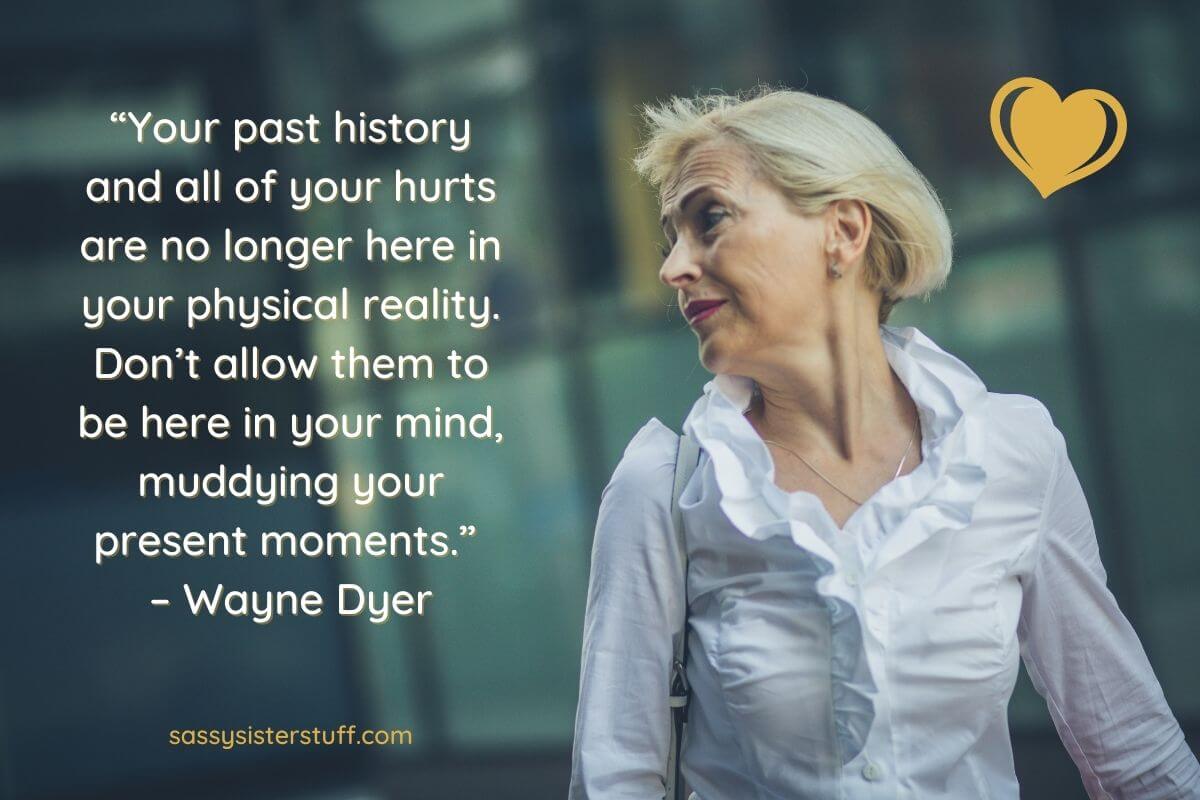How to Leave the Past in the Past When Dealing with Trauma
This is going to be a deeply personal article based on my own experience with trauma. I will be sharing with you how to leave the past in the past when dealing with trauma. Sort of. Let me explain.
I am a PTSD survivor. I won’t tell you that you can leave the past in the past completely as if the trauma never occurred, because I don’t believe you can.
But I will tell you that you can learn to live with your past as if you’ve left the past in the past because you are now a NEW YOU. You are a stronger you and a more resilient you. The past is the past but the present and future can be better.
I will be sharing 12 ways to work through the trauma and feel like you have left the past in the past. These strategies helped me finally realize I definitively wanted to live a happy life again and not let past events define my present or future.
I’m going to keep this article simple because people who suffer from trauma don’t need anymore complications. You need simple. You need peace. And you need compassion. So read on…
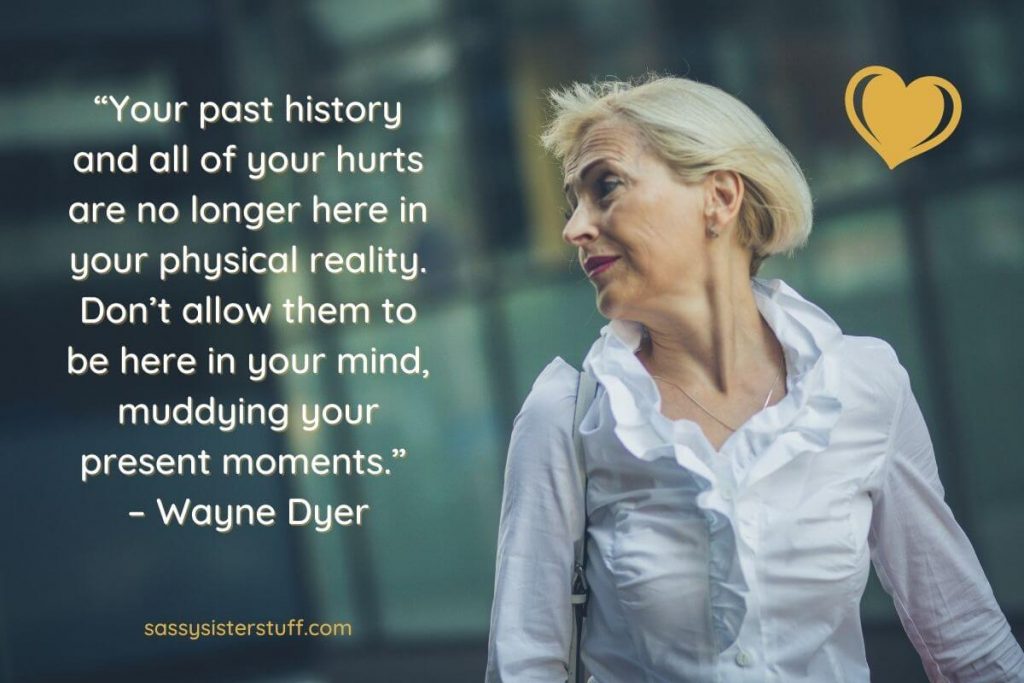
How to Leave the Past in the Past
First, let’s establish that you will never forget the trauma. You will learn to live with the trauma and it will feel as if you’ve left the past in the past. Honestly. You can do this with the 12 tips that I am going to share. It won’t be easy but it will be very possible to get past your past.
1. Accept That the Trauma Occurred
Don’t try to pretend that the traumatic event did not occur. That is not going to effectively help you move forward with your future.
Accept that the trauma occurred; you will likely never be the same; but you will learn from it and be able to see it from a different perspective as time goes by and you become a stronger person.
Accepting that the trauma occurred will allow you to eventually stand tall and realize the valuable lessons you learned from the event.
Acceptance will help you become stronger and walk into your future with more confidence and a positive mindset.
2. Change Your Mindset About the Trauma
You will likely wonder how you will ever be able to stop dwelling on the past and start moving forward. It’s going to be important to understand that you will need to change your mindset in order to start living in the present.
Understand that you will be able to move forward when the time is right. But you may consciously need to work on it.
Understanding that you have choices is a start to changing your mindset about the trauma. You do not need to pretend like the trauma never happened. But you do need to leave it in the past so that you can see what’s going on in the here and now.
You must consciously focus on the positive relationships in your life, the beauty around you in the world, and the future you want to create for yourself instead of living in your head in the past.
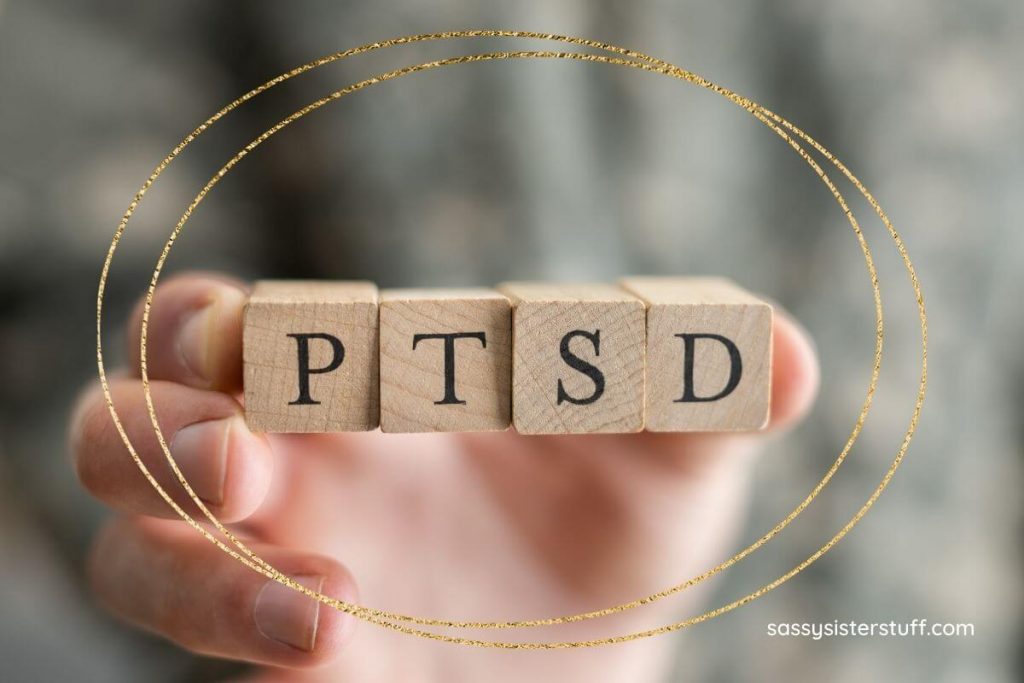
3. Don’t Be Afraid to See a Counselor
Some people resist talking with a counselor about their troubles. You have been through a traumatic experience that could potentially impact the rest of your life.
There are specialists and experts out there who are trained to help victims of trauma. Don’t be afraid to talk with someone. It will move your progress along more quickly. Counselors have proven strategies that will help you get past the traumatic event.
You may need to talk with a few counselors to see which one you feel most comfortable with, but make it a priority in your schedule.
4. Talk to Your Doctor About Medication
Some people believe medication is a sign of weakness. Nowadays, we know that asking for help is actually a sign of strength. Admitting that you need help demonstrates your emotional capacity to know what you need to recover.
It may just be medication to help you sleep because that’s when the trauma replays over and over in your mind. Or it may be medication that you only take when you go into crowds because your anxiety is triggered. It doesn’t have to be something you take forever.
The medication may well be temporary. It was for me. Once I made a dent in the process of working through the trauma, I stopped the medication and was able to use other strategies to move forward with recovery.
5. Write About What Happened to You
You don’t have to let the past be the past as if it never happened. Write about it. Talk about it when given an opportunity. Deal with it in a matter of fact manner. It happened. It was horrible.
But remind yourself that my past is not who I am. Give yourself time to write or talk about it so you are not pretending it never happened.
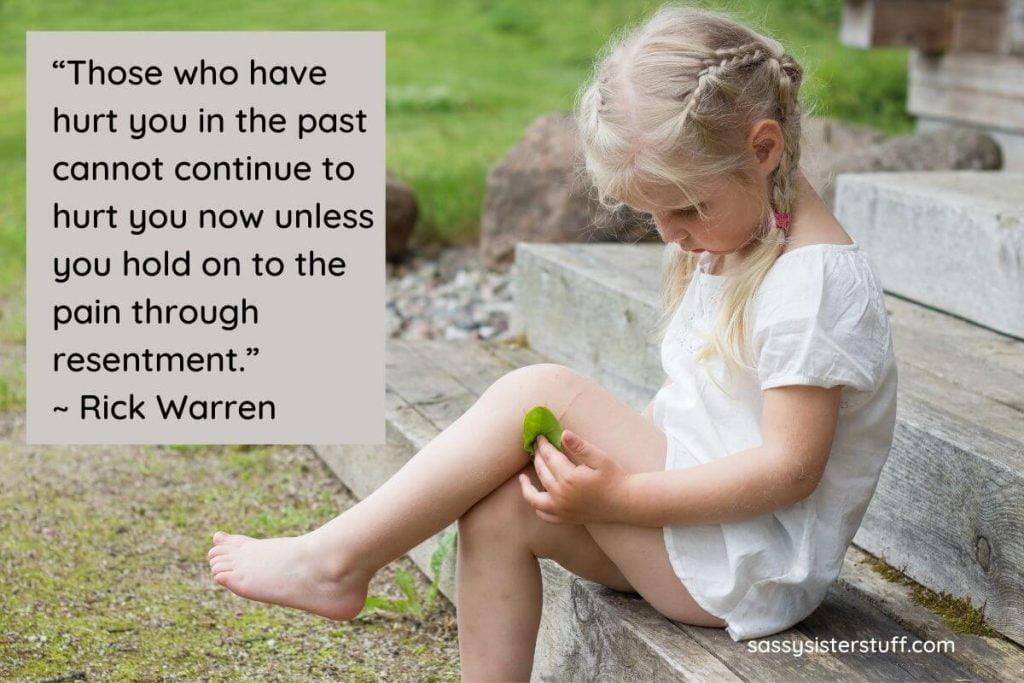
6. Give Yourself Time
Understand that trauma takes time to overcome and don’t rush it. Accept that you will recover but it takes time. You don’t know how much time, but acceptance and time work hand in hand in the recovery process.
I remember reading several reports from doctors who evaluated me after the traumatic event and they all referred to the fact that time will help the recovery process.
7. Don’t Beat Yourself Up Over What Happened
Understand that your version of the traumatic event(s) is your truth and no one else’s version matters. Experiences can be recalled differently and it’s perfectly normal. The trauma occurred to you. You are the victim.
Don’t play it over and over again in your head trying to figure out if you could have done something different. Be gentle with yourself and forgive yourself. Forgive yourself for questioning the occurrence of the trauma… forgive yourself for questioning if you did something wrong… and forgive yourself for feeling bad about what happened. Remember, YOU are the victim. You are permitted to have ANY feelings you want about the event(s).
8. Listen to Your Emotions
Be sure to know if and when you are ready to let go of what happened to you. Or are you holding on to it to avoid the challenge or hardship of moving forward?
Are you truly ready to let go and start living a happy life again? Listen to your emotions. Feel your feelings.
If you work through all the emotions instead of denying them, you will make it to the point of wanting to live a happy life again much sooner.
If you deny those emotions and feelings, it will take you much longer to get to get through the recovery process.
Sit with your emotions. Acknowledge each one. You will get to the point where you are ready to move forward toward happiness again.
Little by little, sit with one emotion at a time and ponder it. Feel it in every inch of your body. Just imagine how many emotions you may have about this traumatic event. You’ll need to deal with each one.
Don’t try to ignore your emotions about what happened to you.
9. Set Aside a Time Each Day to Think
At one point in my recovery, I used a strategy where I allowed myself a designated time of every day to ponder the trauma and all it meant. I found it quite helpful as I went through that stage of my recovery.
It was a somewhat odd time of the day (so you may want to choose a different time) but I would do it right before bed. I would think and feel whatever I needed to think and feel for 10-20 minutes. Anger. Sadness. Frustration. Total recall of events. Whatever popped into my head about the event.
Then, I would physically act as if I was taking those thoughts from my head and putting them in a lock-box on my nightstand to lock them away for the day. The visualization and physical act of shutting down the thoughts and locking them away allowed me time to acknowledge my thoughts and feelings, but symbolically shut them down after a designated amount of time.
In other words, allow yourself time to think about what happened to you but don’t allow it to define your future or your present life.
Pin to Pinterest for Later
10. Accept That You Are a New You
Over time, you will become a new you. However, that does not need to be a bad thing. You can take the lessons you learned from the trauma and put them into action. Become a stronger person with more confidence and wisdom.
Maybe you will learn to communicate more effectively and avoid secrets. Or maybe learn to be more cautious and protective of your heart and emotions.
You may learn to trust your instincts better. And therefore, learn to act on your instincts quicker to protect yourself in the future.
Your past contributes to who you are today. And how you respond to traumatic events can make you stronger in so many ways tomorrow.
11. Look for Life Lessons
Every event in your life helps you become the magnificent person you are meant to be in this world. Each event, good or bad, helps to form your thoughts, intentions, lifestyle, values, and so much more.
As you go through the recovery process, think about life lessons you can take away from the traumatic event. How you could be more prepared the next time. How could you avoid the situation the next time.
But don’t go to a place of self-blame; don’t beat yourself up about what happened to you.
Ask yourself how you can become stronger as a result of this trauma or how you can impact the world because of what happened to you.
Maybe you were meant to become an advocate for others who have suffered horrible, traumatic events.
Maybe you were meant to become a speaker about how to overcome traumatic events. Or maybe you were meant to mentor just one person who suffered a similar trauma. It could be someone you meet in 10 years, but you will make an impact on that one person’s life.
Look for lessons that you can carry forward in a positive manner that supports your recovery and helps you become the person you are meant to be.
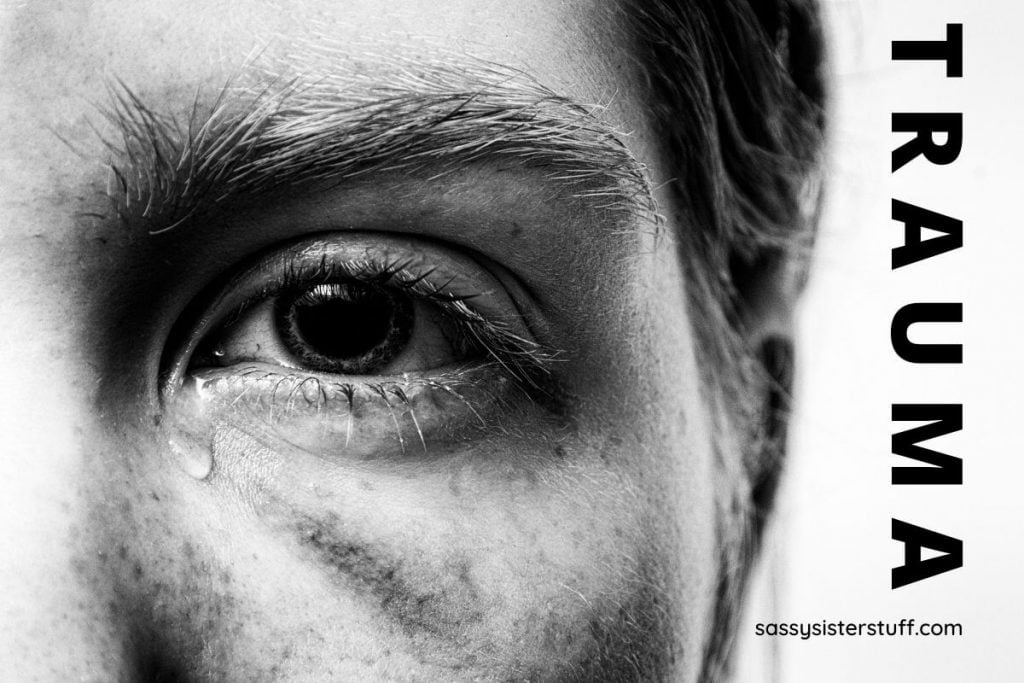
12. Avoid Becoming Cynical or Obsessed
Don’t let past trauma cause you to become negative, cynical, or obsessed with the wrongs in life. I allowed this to happen and all it does it make you miserable.
It does not change the fact that the trauma occurred. Nor does it take away the memories of the event.
Becoming obsessed with the wrongs in life takes away from the happiness in life. You forget to see the beauty and goodness that is all around you because you have internalized the negative emotions.
If you have trouble releasing the anger or negativity surrounding the trauma, a counselor has strategies that can help you. There are also many self-help books available that can guide you through changing your mindset.
Be consciously aware that it’s very easy to become obsessed with what happened to you. In the long run, that obsession can potentially cloud the happiness that surrounds you and you forget how to see the happiness in your life.
I hope these 12 steps have given you ideas about how to leave the past behind you and how to move forward in your life. Don’t allow past events to shape your future in a negative manner. There are things you can do to become an even better version of yourself after trauma!
I found this article to be very helpful in my recover and in my research. It’s a short article and very easy to read about leaving the past behind. You may find it helpful, too.
Leave Your Past Behind and Set Yourself Free
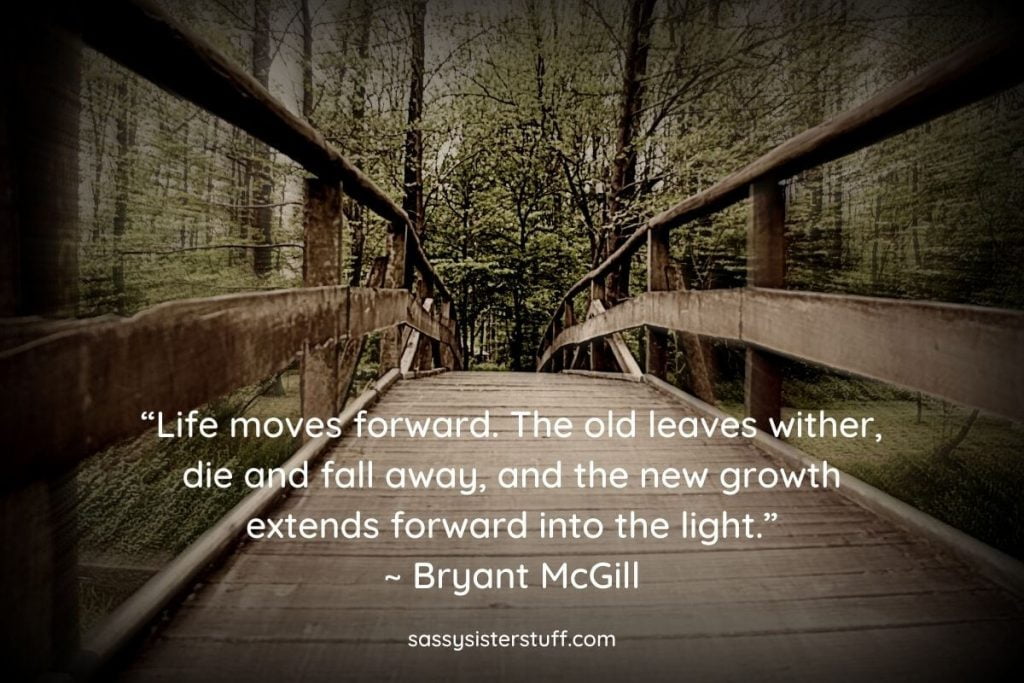
Quotes About Leaving the Past in the Past
For additional inspiration, hang on to the quotes about leaving the past behind in this article. They helped me learn to move forward from my trauma and I hope they will help you, too.
Here are a few more of my favorite leave your past in the past quotes for inspiration.
“Yesterday’s the past, tomorrow’s the future, but today is a gift. That’s why it’s called the present.”
Bil Keane
“You never know how strong you are until being strong is the only choice you have.”
Bob Marley
“Your past does not equal your future, unless you choose to live there.”
Tony Robbins
“We do not heal the past by dwelling there. We heal the past by living fully in the present.”
Marianne Williamson
“Life is incredibly beautiful. Leave the past behind and let time drift it away.”
E A Cabaltica
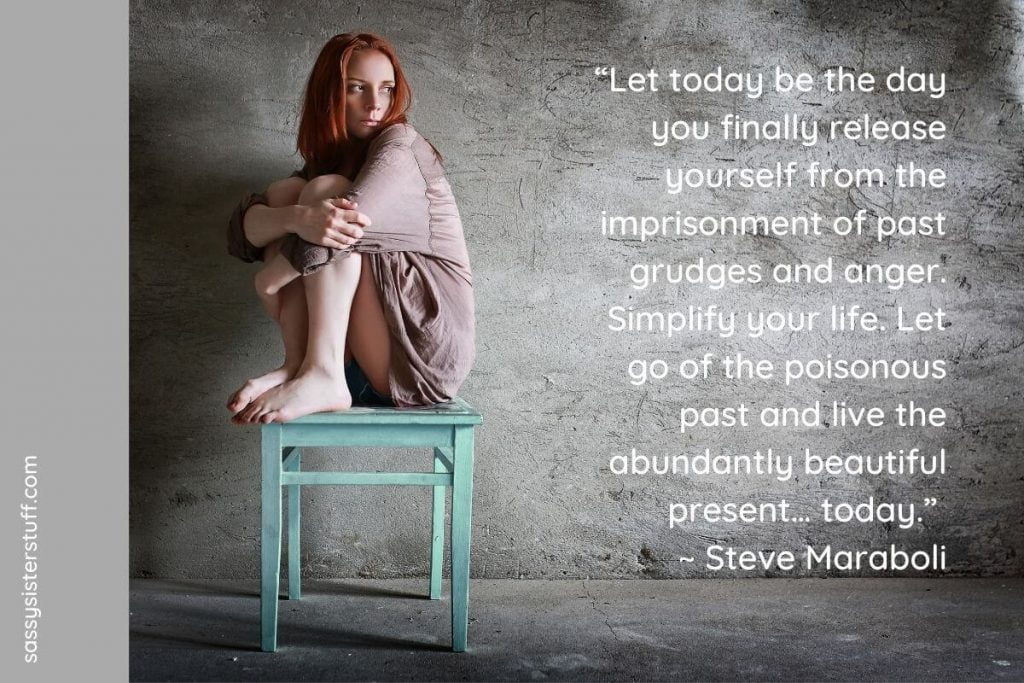
Final Thoughts: Leave the Past in the Past
It’s been 5 years since my personal trauma. It’s been a long five years, but I survived. You will survive, too. I promise. You will be able to leave the past in the past, too.
But I know, you want to do more than survive. You want to thrive. AND YOU WILL.
Choose one of the tips above and work on one step at a time. Then choose another and so forth. Or work on all of them at the same time. Whatever works best for you.
That’s the beauty of walking through the process of recovering from trauma. You can do it your way and take as much time as you need.
Don’t allow anyone to suggest that there is a time frame for when you should leave the past in the past. There is NOT. But make it a process that moves your forward in life. Don’t let it stop you in your tracks.
Your trauma will always be with you, but with the tips above, you will learn to NOT ALLOW it to control your life. You will learn to live happily as the NEW YOU who experienced something bad. But you will thrive again.
YOU WILL GET THROUGH THIS!

In addition to the tips above, please consider joining an online support network, or a small in-person community of trauma survivors for support. Again, it’s your journey so you know what might work better for you.
You may want to read this article. It is one of my most extensive articles about bringing happiness to your life. How to Bring More Cozy into Your Life includes recommendations for your mental, physical, social, spiritual, and intellectual wellness. It’s based on the Danish concept of hygge. (Denmark is consistently the happiest country in the world!)
I’m going to stop before I ramble on forever. When I write about something so personal, I can go on for too long.
But let me share that I still suffer from daily headaches, communication challenges, processing delays, memory/recall issues, and executive functioning difficulties due to the trauma that occurred to me. This is why I do not believe you can completely leave the past in the past when dealing with trauma. But you can move past it. Sometimes as a NEW YOU.
Using the tips above, the NEW ME can thrive in a different way than before, just as if I was able to leave the past in the past. And so can you!
Love to ALL! ~ Susan

